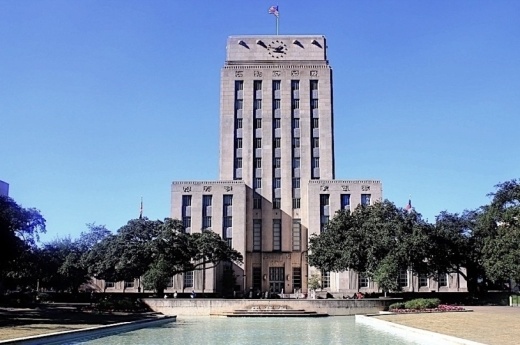While no action took place related to the presentation, some of the ideas pitched would result in new fees for households in the city.
The overview
In the Oct. 7 Budget and Fiscal Affairs Committee meeting, Deputy Controller Will Jones presented a high-level breakdown of Houston’s general fund revenues compared to those of its peer cities, including Austin, Dallas, Fort Worth, San Antonio and El Paso.
He said if Houston were to consider adopting similar general fund strategies, such as charging more monthly residential fees, the city could increase its savings.
Hollins’ office put together the comparison after City Council members requested more information about how other big cities across the state manage their fund balances. The request followed a conversation about the city’s need for more rainy day funds to support extreme weather preparedness and response, according to previous Community Impact reporting.
“We’re not trying to be like every other city," said Sallie Alcorn, council member and BFA committee chair. "We’re Houston. We’re our own city, but we do have to be realistic about the revenue side of the equation with growing expenses.”
Breaking it down
The Oct. 7 breakdown compared revenue sources, such as property tax, city fees and interfund transfers, based on each city’s most recent budget.
The report showed that Houston is the only major Texas city not to charge garbage/environmental fees or transfer funds from its utility budget. The five other cities in the report make hundreds of millions in revenue from the fees each year, Jones said, which can then be transferred to their general funds and used for other city expenditures such as public safety.
San Antonio, for example, generates approximately $655 million in general fund revenue from residential fees each year, according to the report. Jones said the revenues represent what’s left after the cost of delivering services, such as garbage, water and electricity, to residents.Additionally, the city of Austin charges residents a transportation fee through their utility bills—ranging from about $14-$21 per month—to fund the maintenance and repair of roadways, sidewalks and other infrastructure. Jones said Austin generates approximately $115 million from the fee each year.
Diving in deeper
Using an average of per-household fees in other cities, Houston could generate:
- Approximately $164 million annually from garbage/solid waste fees ($33 per month from each household)
- Approximately $15 million annually from clean community/environmental fees ($3 per month from each household)
- Approximately $100 million from transportation fees ($20 per month from each household)
Jones said the city’s legal staff would have to look into the feasibility of generating revenue from Houston’s water and sewer systems. He said there may be limitations based on the language of Houston’s bond agreements, in which case it may not be a viable option.
Council did not take any action on the presentation.





